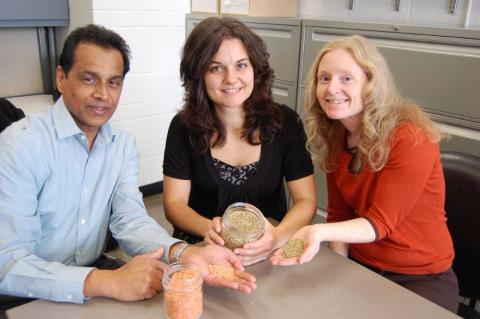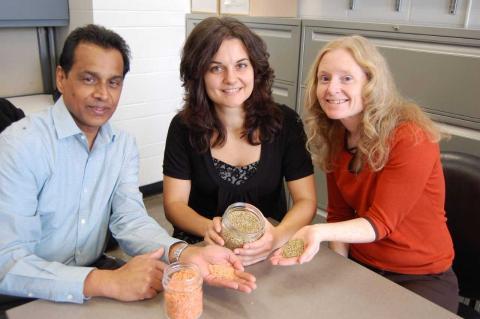
Credit: University of Guelph
Replacing potatoes or rice with pulses can lower your blood glucose levels by more than 20 per cent, according to a first-ever University of Guelph study.
Prof. Alison Duncan, Department of Human Health and Nutritional Sciences, and Dan Ramdath of Agriculture and Agri-Food Canada, found that swapping out half of a portion of these starchy side dishes for lentils can significantly improve your body's response to the carbohydrates.
Replacing half a serving of rice with lentils caused blood glucose to drop by up to 20 per cent. Replacing potatoes with lentils led to a 35-per-cent drop.
"Pulses are extremely nutrient-dense food that have the potential to reduce chronic diseases associated with mismanaged glucose levels," said Duncan, who worked on the study with PhD student Dita Moravek and M.Sc. students Erica Rogers, Sarah Turkstra and Jessica Wilson.
Yet very few Canadians eat lentils, she added.
"Canada has a huge production of lentils, but we export most of it and only 13 per cent of Canadians eat them on any given day," said Duncan. "We are hoping this research will make people more aware of the health benefits of eating pulses."
Published and specially featured in the Journal of Nutrition, the study involved 24 healthy adults fed four dishes – white rice only, half white rice and half large green lentils, half white rice and half small green lentils, and half white rice and half split red lentils.
Researchers measured glucose levels in the participants' blood before they ate and during two hours afterward. They repeated the process for white potatoes alone and the same combinations of potatoes and lentils.
"We mixed the lentils in with the potatoes and rice because people don't typically eat pulses on their own, but rather consume them in combination with other starches as part of a larger meal, so we wanted the results to reflect that."
Blood glucose fell by similar amounts when half of the starch was replaced with each of the three types of lentils.
Blood glucose comprises sugar found in the blood during digestion in the upper digestive tract and depends on the starch content of foods consumed.
Pulses, such as lentils, can slow digestion and the release of sugars found in starch into the bloodstream, ultimately reducing blood glucose levels, said Duncan.
"This slower absorption means you don't experience a spike in glucose. Having high levels over a period of time can lead to mismanagement of blood glucose, which is the hallmark of Type 2 diabetes. Essentially, eating lentils can lower that risk."
Pulses contain components that inhibit enzymes involved in absorption of glucose, and fibre contained in these foods can encourage the production of short-chain fatty acids, which can also help to reduce blood glucose levels, added Duncan.
Health Canada requires a 20-per-cent reduction in blood glucose levels before a health claim about blood glucose lowering can be approved, said Duncan.
"We are hoping that building evidence for approval of a health claim for pulses will further encourage people to add pulses to their side dishes."
###
Contact:
Prof. Alison Duncan
[email protected]
Media Contact
Prof. Alison Duncan
[email protected]
@uofg
http://www.uoguelph.ca
Original Source
https://bit.ly/2l8KIKo http://dx.doi.org/10.1093/jn/nxy018





